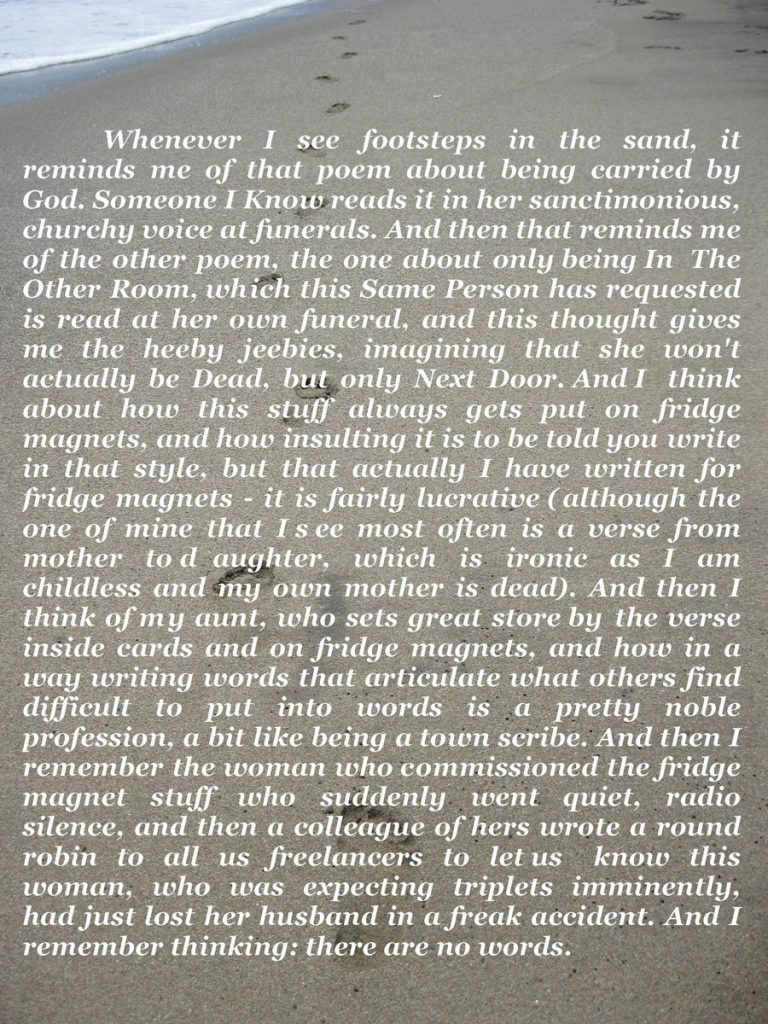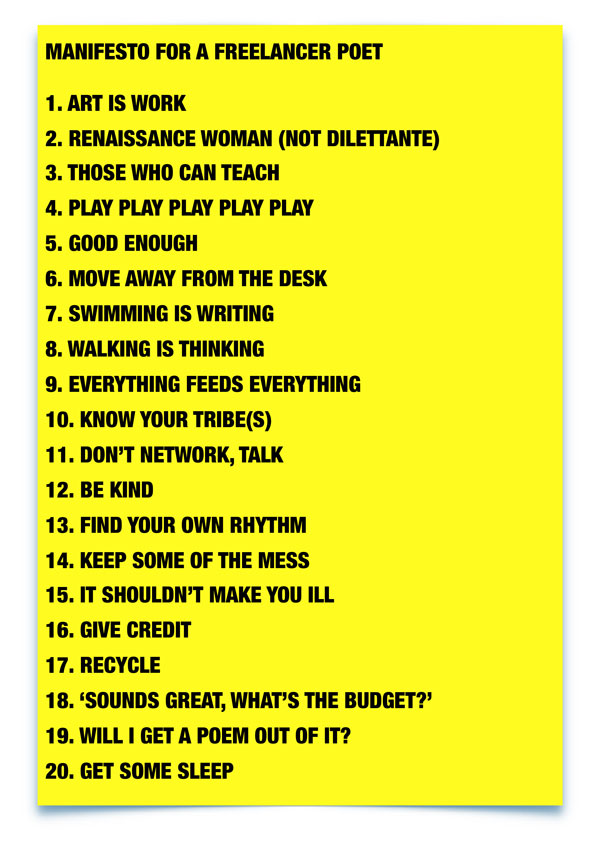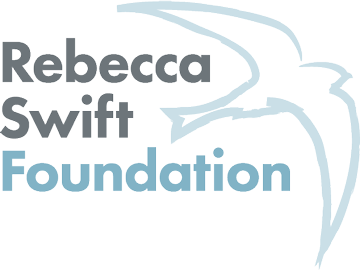
Claire Collison was a winner of the very first Women Poets’ Prize, and is a freelance educator and facilitator. Claire specialises in using art and place to generate creativity, including for The Photographers’ Gallery, Kettle’s Yard, and the Government Art Collection. We asked her to reflect on how poets might live as freelancers…
You know that wee extra pocket on your jeans? That’s for poetry earnings!
Twitter
I design resources, but I’m not usually the subject, and I admit I’ve found the process of writing this article unsettling: half the time I feel better qualified to write a ‘how not to’ than a how to. But not knowing is a cornerstone of writing, and there must be lots us plate-spinning our creativity with freelancing, and somehow I’ve been doing it for thirty years…
I make a living doing things I’m passionate about and that reflect my experience: there is no day job, it’s all a blur. My portfolio (I laughingly call it a portfolio, like I planned it) includes writer, teacher, creative, facilitator, visual artist, and resource designer, most recently for the
Government Art Collection. My experience includes having M.E. for the best part of my thirties, being a full-time carer, and having breast cancer. I’ve been Arts Editor for Disability Arts Magazine, Visual Literacy facilitator for the Photographers’ Gallery, and had residencies at the Women’s Art Library and a lido. I devise walking and writing workshops, and I’ve written and performed a single-breasted life modelling monologue. Everything informs everything. The downsides are manifold – I care too much, there’s no off-switch, and it’s precarious. For every project I secure, there are easily twice as many I don’t get. But the positives outstrip the negatives, and they are the projects that fit like a glove, when I know my particular blend of experience and skills make me the best woman for the job.
Poetry informs all my freelance work –

Disclaimer: I’ve no dependents, no mortgage, and until now my rent has been low. Also, when I was starting out in the 80s, there was the Enterprise Allowance scheme and subsidised adult education, that meant I could continue studying long after I’d completed a fully state-funded, non-vocational degree: I am a product of the slacker generation. These factors have affected my freedom to work on things I love.

What percentage of poets make a living solely out of being poets? I had no idea, so I asked Twitter. The consensus was that for most, poetry doesn’t pay (some even suggested it shouldn’t pay – that commissions compromise the poet’s integrity – and I do wonder how ingrained this idea is, and how it sabotages us in terms of taking what we do seriously.) Generally, the responses helped me define what I meant by earning a living and being a poet –
If anyone claims to earn a living from writing poetry, and writing poetry alone, then their idea of ‘a living’ is probably quite different to mine (like they have no rent or mortgage to pay, no dependents, no expensive cheese habit)
Martha Sprackland
It depends what you define as making a living from it – if this definition is flexible enough to incorporate a wide range of activities, then yes, my sole income is as a freelance writer…My freelance work includes teaching, running workshops, mentoring, editing, commissions and performances. All of these things are very much bound up with my practice as a writer and influence my own work. I thought I would make a thread of some of the stuff I do to make a living…
Kim Moore
It’s reassuring to realise we are all juggling – and while Kim’s portfolio is mind-blowing, I admire how she includes all her activities as part of her identity as a writer and a poet. For me this is key: it validates everything I do as a freelancer – I’m not a dilettante dabbler, I simply have a complex portfolio! Everything in it feeds my creativity and enhances my skill set. I know this, but it’s taken me a long time to feel it. Even things we are required to provide to make us professionally credible, like designing a website or even organising a CV seem geared towards an expectation of linear career progression, when this just isn’t my experience. Coincidentally, I just found this in my original letter of application for the Women Poets’ Prize –
I have a tendency to tidy my writing, and not trust the energy and mess. I think there is something fundamentally feminist about this energy and mess, and I want to be given permission to be articulate, but less polite: to be multiple and messy
Claire Collison
A recent workshop with Merlin Evans organised through Arts and Health Hub provided some techniques to identify our Unique Selling Points and communicate them effectively. Merlin invited us to take time to reflect on all our work experience, no matter how diverse and seemingly unconnected –
- Make 2 columns, and for each project you’ve worked on, or job you’ve had, make notes.
- In one column write what you loved, enjoyed, found easy.
- In the other list what was difficult, unenjoyable, etc.
- Look through the positive column, underlining any recurring themes.
- Now find the ‘golden thread’ that links these (there will be one!)
- Use this golden thread to develop your own USP.
- It might help to make a drawing or mind map of it.
- Now begin to work on a statement that communicates this.
- You might realise that you need more than one statement – the important thing is to make it easy for someone who doesn’t know your work to understand what you have to offer.
I reckon I wear my Poet’s hat for any of the work I do, but it’s worth mentioning: to non-poets, being a poet isn’t all that: we can be perceived as esoteric – unproductive, even, in basic terms of word count – so when I’m working on an application outside of Poetryland, I wind back and extrapolate all the transferable skills: good with words, empathic, imaginative problem solver.
Excellent communicator. Self-motivated. Concise. That kind of thing.
It’s also worth adding, one quality we have in spades as poets and will lean on as freelancers is resilience – the way we keep faith with our creativity. That thick skin we develop to take the knock backs and inevitable rejections? It comes in handy.
Another take-home from Merlin’s workshop was to write a personal manifesto. I love a manifesto; both Sister Corita Kent’s List of Rules and Paula Varjack’s Manifesto For Arts in a Crumbling Economy are taped to my wall. Merlin suggests we visualise an ideal day, when all the necessary conditions are in place to support our creativity, and use this as a basis. Mine is a combination of wish list, rules and mantras. Please help yourself to anything that’s useful. Of course, it’s idiosyncratic, and that’s the point, but hopefully some of it will resonate. (‘Sounds great, what’s the budget?’ comes from Daniel Regan of Arts and Health Hub, and is invaluable for those awkward conversations, where money hasn’t been mentioned.)
Formalising a manifesto has been empowering: it’s a contract with myself, and a series of ground rules between me and the freelance world. I recommend giving it a go. Share it and discuss it.
Review and revise it. Stick it somewhere prominent, and use it to remind yourself what you already know.

More links that might help you
Walk Coach Learn – Coaching to help you feel more confident, less stressed and more able to adapt to change.
Engage – the lead advocacy and training network for gallery education, representing arts educators, organisations, freelancers and artists from across the UK and over 20 countries worldwide.’
NAWE – supporting writers and good practice in teaching and facilitation in all settings.
